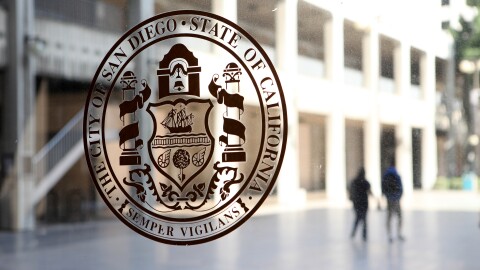
Megan Burke
News EditorMegan Burke is an Emmy-award winning news editor overseeing the environment, health, and racial justice and social equity reporting beats. Prior to her current role as editor, Megan spent more than a decade as a producer for KPBS Midday Edition, a daily radio news magazine and podcast. Other news production credits include KPBS Evening Edition, KPBS Roundtable, and San Diego’s DNA, a two-part documentary highlighting the region’s oldest traditions and culture using personal artifacts and oral histories of San Diegans.
Before joining the news staff, Megan worked in KPBS’ outreach team and managed large-scale campaigns including KPBS’ domestic violence awareness and prevention initiative. The project included Emmy award-winning television spots, an extensive and interactive website, collaborative events and programming, as well as a statewide grant campaign. Megan is also credited with producing the Black History Month and Hispanic Heritage Month Local Hero Awards Ceremonies.
Megan is a graduate of the School of Journalism and Media Studies at San Diego State University. She has been a part of the KPBS team since 1999. In her free time Megan and her husband enjoy delighting their young daughters with "new" music.
-
Mayor Jerry Sanders announced this week that the city will modify its water conservation plan for the winter. San Diego residents have conserved more than the city expected, and will not be asked to reduce watering to one day a week. Meanwhile, state lawmakers are discussing ways to improve California's water delivery system, and to prevent the state from going dry.
-
KPBS reporter Joanne Faryon has been looking into beef. She's learned industrialization and our demand for a big, juicy and cheap steak has created corn-fed, hormone-injected, and fast-growing cattle. Cattle that changes hands and travel thousands of miles before arriving at your local grocery store.
-
Pamela MacPhee, a mother of three, was a surrogate mom for a family member whose wife suffered from cancer-related infertility. She describes her experience in a new book, "Delivering Hope."
-
What exactly are you eating when you bite into that cheeseburger or potato chip? You might be surprised. We interview "The Hair Detective," Dr. Stephen Macko, to find out how the food you eat shows up in your hair.
-
Tomatoes are the most frequently bought and the most commonly homegrown vegetable in the United States. With all that popularity we wondered whether consumers can tell the difference between organic and conventionally grown tomatoes, and is one growing method better that the other? KPBS Environmental Reporter Ed Joyce put organic, heirloom and conventionally grown tomatoes to the test and tells us what he's found out.
-
Skin cancer is the most common form of cancer in the United States with one million cases diagnosed each year. Xeroderma Pigmentosum (XP) is a rare genetic condition that makes skin cancer a very real threat. It is an extremely rare disease which affects one in a million American children. In a remote village in Guatemala, 26 cases of XP have been diagnosed. San Diego dermatologist, Dr. Bari Cunningham, organized a team of health workers to travel to Guatemala to help. Their experience was made in to a documentary, Hidden From Light, which tells the story of a group of kids whose DNA could help change how skin cancer is treated.
-
The Guardian found many California cities spent more COVID-19 relief funds on law enforcement than rent relief and health services.
-
The federal agency says sea levels on the West Coast will rise 8 inches by 2050, 1½ feet by the end of the century.
-
With Alice Childress' 1955 play "Trouble in Mind," The Old Globe brings questions and conflicts about diversity in the American theater to center stage.
- County official overseeing animal shelters complained of 'shit dogs,' too few euthanasias in voice message
- 20 free ways to explore San Diego Design Week 2025
- New trash cans are coming to San Diego curbs in October
- Encinitas rescinds vote on ICE emergency, then reaffirms most prior actions
- Kirk shooting videos spread online, even to viewers who didn't want to see them









